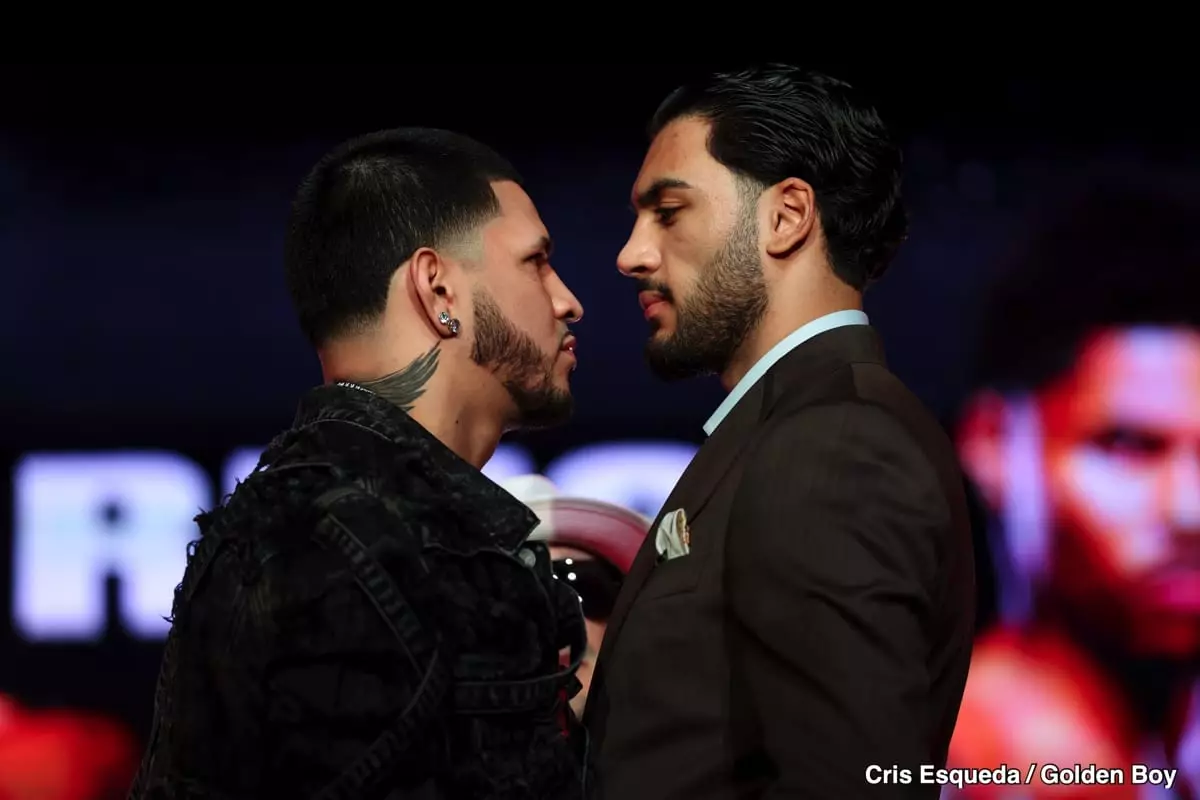In the world of professional boxing, the moments leading up to a fight can often be as pivotal as the bout itself. During the recent press conference for the super middleweight clash set for July 12th at Louis Armstrong Stadium in Queens, New York, Edgar Berlanga showcased his psychological strategy against Hamzah Sheeraz. The tension in the air was palpable as Berlanga, with an intimidating record of 23 wins and just one loss, leaned into Sheeraz’s personal space during their face-off. The 6’4″ British fighter, boasting a record of 21 wins and one draw, appeared visibly shaken, revealing a troubling sense of fear that could potentially impact his performance in the ring.
The sheer audacity of Berlanga’s bravado not only set the tone for the event but also illustrated a significant psychological advantage. Boxing isn’t just about physical strength; it’s a mental duel played out in the public eye. Berlanga’s assertion, “I’m knocking this mother f* out,” echoed through the venue, resonating with the audience while simultaneously cornering Sheeraz in a box of self-doubt. Such tactics can undermine an opponent’s confidence long before the first bell rings.
Analyzing the Mind Games
The confrontation between Berlanga and Sheeraz exemplifies the importance of the psychological aspect of boxing. Berlanga’s approach was calculated; he didn’t just speak bravado but made direct eye contact, challenging Sheeraz’s composure. The power of presence should never be underestimated; an athlete who can project confidence and fearlessness can often sway the mental landscape of their competitor. In the lead-up to the fight, Berlanga’s insistence on dominating the narrative—referring to Sheeraz’s recent fight as a “gift”—was a blatant attempt to strip away any semblance of self-assurance that Sheeraz might carry.
In contrast, Sheeraz seemed to shrink under the pressure. While he offered responses, his body language spoke volumes. He appeared visibly rattled—his hesitation during the face-off suggested that he was ill-equipped to handle Berlanga’s aggressive demeanor. Many may argue that confidence in boxing stems from extensive training and a solid game plan; however, as this exchange demonstrated, the psychological groundwork laid before a fight can often dictate its outcome. Berlanga’s intimidation tactics—which seemed to work effectively in this instance—highlight a strategy that can be just as crucial as punch placement or footwork.
Setting the Scene in the Ring
As the countdown begins for this highly anticipated bout, the location plays a vital role in the dynamics of the fight. New York, often hailed as a boxing capital, is Berlanga’s backyard. The exuberance of an energized home crowd can give a significant edge to the fighter who can harness that support, and Berlanga’s proclamation of being in the “lion’s den” serves as both a battle cry and a psychological weapon. He’s not merely expressing confidence; he’s layering pressure on Sheeraz, who must now contend with the weight of the audience’s expectations.
Experience in high-stakes environments cannot be overstated. Berlanga, with established success, stands on ground where he thrives. Sheeraz, meanwhile, faces unique pressures—coming from London, stepping into the electrifying pulse of New York boxing culture where he is the underdog in more ways than one. The locale may serve as a double-edged sword; inspiring him or amplifying the anxiety that accompanies such a fierce rivalry.
Bravery in the Face of Fear
There’s an old adage in boxing: “Everyone has a plan until they get hit.” Berlanga’s verbal onslaught suggests he’s hungry to land not just punches but psychological blows that waver Sheeraz’s confidence. The British fighter must summon extraordinary bravery and punching precision if he hopes to withstand the storm that Berlanga promises to unleash.
As the fight approaches, all eyes will be on how Sheeraz responds to the intense atmosphere crafted by Berlanga’s words and demeanor. Winning in a physical contest requires grit and resilience, but in a sport where self-belief can sometimes determine the victor, Berlanga may have already claimed a portion of the victory—or at least, the mental upper hand. If Sheeraz can redefine his narrative and emerge not as a fearful challenger but as a fighter armed with his own psychological fortitude, he might just surprise the audience and, perhaps, Berlanga himself.

